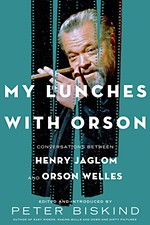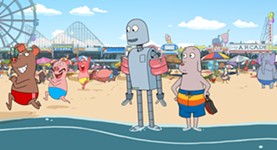The Boy Wonder at 100
Alamo Drafthouse screens Orson Welles centennial retrospective
By Kimberley Jones, Fri., April 3, 2015
The life and career of Orson Welles is so vast and bedeviled with what-might-have-beens it's no wonder we're still talking about him 30 years after his death, 100 years since his birth. It's this centennial that has occasioned a new biographical documentary, Chuck Workman's Magician: The Astonishing Life and Work of Orson Welles, and also a two-months-long retrospective at the Alamo Drafthouse at the Ritz, curated by Drafthouse programmer Tommy Swenson.
Magician provides a survey of Welles' films (finished and otherwise), bolstered by archival interviews with Welles and present-day commentary from critics, biographers, and filmmakers, including Richard Linklater, Steven Spielberg, Julie Taymor, William Friedkin, and Welles intimates Henry Jaglom and Peter Bogdanovich. There's little in Workman's doc that any pre-existing fan of Welles probably doesn't already know, but the film effectively compacts the many stages of Welles' sprawling filmography.
There was the early, stratospheric success in theatre (he first talked his way onto the stage at Dublin's Gate Theatre when he was still a teenager) and radio, too. Then he headed to Hollywood and made Citizen Kane. It was a critical success even then, though the strong arm of William Randolph Hearst, who was unhappy with the obvious resemblance, sucker-punched distribution; it took a while before Citizen Kane started being bandied about as the greatest movie ever made. Welles lost his right to edit the director's cut at home studio RKO and, after toying with going into politics (his FBI file put a stop to that), the "boy wonder" embodiment of the American Dream eventually went into semi-exile in Europe – a better fit for him, perhaps, both artistically and for finding willing financiers. When he returned to America, he still couldn't get along in the studio system. (It took decades to restore his brilliant border noir Touch of Evil to something resembling his original vision.) In later years, there were paycheck gigs that tarnished his reputation but were emblematic of the artist's commitment to funding his personal (mostly unrealized) projects. He grew enormously fat, but wore well his girth, and its metaphor: that Orson Welles had an appetite for everything.
There were 14 feature films released in his lifetime, and an additional bounty of incomplete but tantalizing works that his fans are still combing through. The standard line is to wonder what might have been – if he'd held onto his director's cut, if he'd found adequate funding, if he'd held his concentration longer – but the what-might-have-been line of inquiry, while an interesting daydream, does a disservice to what actually was: a singular life and an extraordinary career.
The Magnificent Orson Welles
April 4-May 25, Alamo Drafthouse at the RitzMagician: The Astonishing Life and Work of Orson Welles (DCP) April 4, 1:30pm; April 5, 1:45pm
Citizen Kane (1941, 35mm) with "Too Much Johnson" (1938, digital) Following his infamous radio production of H.G. Wells' The War of the Worlds, which sent the country into a panic and police to his front door, Welles japed: "I didn't go to jail; I went to Hollywood." Citizen Kane was his bravura first film, and the first line in every obituary, too. Screens with "Too Much Johnson," a rediscovered short comic film written and directed by Welles and starring Mercury Theatre stalwart Joseph Cotten and Welles' first wife, Virginia Nicholson. April 4, 4pm; April 5, 4:15pm
The Magnificent Ambersons (1942, 35mm) Indisputably great, but also the most heartbreaking what-if: When Welles left the country to work on It's All True, RKO assumed control of the film in post-production, bowdlerizing Welles' original 132-minute picture for an 88-minute edit supervised (and in part reshot) by Robert Wise. Reportedly, the excised reels were dumped in the Pacific Ocean. April 6, 7:15pm; April 9, 4:50pm
Journey Into Fear (1943) (35mm) April 11, 4:40pm
It's All True (1993, 35mm) Following Welles' appointment as a goodwill ambassador to South America, he went to Brazil in 1942 to shoot this never-finished docudrama. This cut was assembled in 1993. April 13, 7pm
The Stranger (1946, DCP) Post-World War II thriller about Nazi-hunting that's most notable for Welles' and Edward G. Robinson's cat-and-mousing. April 18, 4:55pm
The Lady From Shanghai (1947, 4K DCP) Welles' only film with second wife Rita Hayworth (although the marriage was over by the time production started), this standout noir is best remembered for its funhouse-mirror final shootout. April 20, 7pm
Macbeth (1948, 35mm) Restored in 1980, this version reinstates the original Scottish accents that were originally overdubbed by Republic Pictures. April 25, 2pm
Confidential Report (1955, 35mm) This European-shot noir, dismissed by some as a knockoff The Third Man, is also known as Mr. Arkadin, which gives some small hint of the many iterations knocking around. The Drafthouse will screen the 99-minute Confidential Report cut of the film from an archival 35mm print via Janus Films. April 27, 7pm
Othello (1952, DCP) with "Return to Glennascaul" (1953, 35mm) Shot over the course of three years and funded in part by Welles' paycheck gigs (including his defining cameo in The Third Man; famously, Welles declined a percentage in the film's profits for a flat – and immediate – fee, which turned out to be a bad gamble). When he ran out of money, he memorably moved the action to a Turkish bath, thus eliminating the need for pricey costumes and compounding ingenuity and thrift in a way that would earn him Richard Linklater's praise as "the patron saint of indie filmmakers." May 2, time TBD
Black Magic (1949, 35mm) May 4, 7:30pm
King Lear (from television's Omnibus) (1953, digital) May 4, 10:10pm
Mystery Movie May 11, 7pm
Around the World With Orson Welles (1955, digital) Travels with Orson! This six-part ITV production journeys from Basque country to Vienna, Paris, London, and Madrid. May 11, 9:45pm
Touch of Evil (1958, 35mm) The 1998 restoration. May 16, 2pm
"The Fountain of Youth" (1958, video) & "The Immortal Story" (1968, video) Two made-for-television short films. Based on an Isak Dinesen work, "The Immortal Story" was Welles' first completed color film. May 16, 4:45pm
The Trial (1962, DCP) Two years after playing the predator in Psycho, Tony Perkins is the preyed-upon Josef K. in this unsettling and underrated adaptation of Kafka's novel. The paranoiac chiaroscuro of old-world Europe – including great use of the abandoned Gare d'Orsay – makes this one a must-watch. May 18, time TBD
Welles Said: An Interview Extravaganza Welles gave great interviews and was a frequent talk show guest; he suffered his fatal heart attack only hours after appearing on The Merv Griffin Show. May 18, 10pm
Falstaff aka Chimes at Midnight (1965, format TBD) Forget Olivier – that's the way Welles would have liked it, at least; he thought Larry was "seriously stupid." Here, Welles made a compelling case for the title of the 20th century's premier actor-director-interpreter of Shakespeare on film. He conjured Falstaff from five of the Bard's dramas and played him to perfection. Welles' biographer Simon Callow calls it his true masterpiece, and it was Welles' favorite, too. May 23, 2pm; May 24, 4:55pm
The Unfinished Films Part 1: Don Quixote May 24, 2pm
F for Fake (1973, 35mm) Welles told his friend Henry Jaglom that "the tragedy of my life is that I can't get the Americans to like it." This American loves it to distraction. In this essay-film, Welles is an outsized, impish showman, telling stories about magic, Pablo Picasso, and the con artist Clifford Irving, and teasing the line between fact and fiction. May 25, 7pm
The Unfinished Films Part 2: The Other Side of the Wind, The Deep, Moby Dick Excerpts from his final stop-and-start projects, including the improvised Hollywood satire The Other Side of the Wind, shot over the course of 15 years and starring John Huston. A new book about the project, Josh Karp's Orson Welles's Last Movie: The Making of the Other Side of the Wind, is out April 22. May 25, 9:30pm
All info subject to change. Check Alamo Drafthouse listings for updated showtimes.












